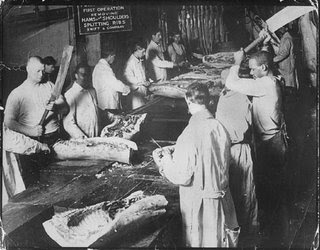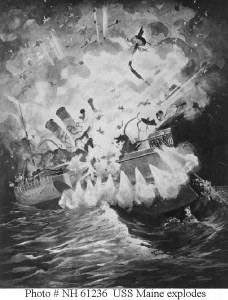Blog #14 – Kids Taking Over – Part 3
Pick one question from the following choices below and submit your answer by class on Monday, March 14. Let’s shoot for 300 words minimum. Dig deep!
1. We watched the School House Rock Video in class for Women’s Suffrage. How accurately do you think it portrays the events and people of the Women’s Suffrage Movement? Give examples. Do you think School House Rock videos should be included in school curriculum? Why or why not? – Autumn

2. The Egyptian people recently overthrew their leader, Hosni Mubarek, after 30 years of oppression. Political experts believe social networking sites such as Facebook and Twitter provided a means for the people to organize an overthrow of an oppressive government. Do you think these social networking websites will change the way civil wars will be fought in the future? Will oppressive leaders become more concerned about the way they treat their own people? Why or why not? Explain. – Mallory
Time Magazine’s latest, “Learn to Love the Revolution.”
Newsweek’s “Feminists in the Middle of Tahrir Square.”

3. If America had stayed neutral even after Germany’s resumption of submarine warfare and the Zimmerman note, what do you think the outcome of the Great War would have been? – Hannah
4. If you had to work in an unsanitary, old meat factory like the characters in The Jungle, what job would you choose? Please explain why. What job would you not do under any circumstances? Please explain your reasoning. – Allison
in The Jungle, what job would you choose? Please explain why. What job would you not do under any circumstances? Please explain your reasoning. – Allison
5. If you were a woman living during World War I, would you be for or against the war? Why or why not? Also, would you be willing to work in the war as a nurse? Or would stay at home and work in the factories or a similar job? Explain your reasons. – Courtney
6. The Spanish-American War lasted less than 3 months and had fewer than 600 American soldiers were killed during the war. In the end of the war, America ended up gaining only two territories that it still holds on to (Guam and Puerto Rico), we went to war with another (Philippines), and one of the territories that we had for a while actually turned against us and now hates us (Cuba). Knowing all of this, do you think the Spanish-American War was really worth it? Why or why not? – Rob
7. Gas prices over the last month have raised a crazy amount. People aren’t able to drive quite as far or have even resorted to riding bikes in this cold Michigan weather! What do you think should be done to lower the gas prices back down again? Is simply not driving your car the answer or should we find some way to make driving affordable once again? Is there another option? – Nathan
Top 10 Reasons to ride your bike instead of driving. #10 is funny.
8. In our readings, there have been many instances where propaganda has determined the result of what is chosen or what the general opinion is of  many Americans. From Wilson being almost worshipped to the glorifying of the Spanish American War, propaganda has played a major part on how we percieve events. Do you think it is wrong to have these messages flooding the airwaves during war time and “brainwashing” America especially if these messages are false (Saddam Hussein planned the 9/11/01 attacks, for example)? Or is it ethical in the fact that our government can put whatever posters they want? Explain. – Emily
many Americans. From Wilson being almost worshipped to the glorifying of the Spanish American War, propaganda has played a major part on how we percieve events. Do you think it is wrong to have these messages flooding the airwaves during war time and “brainwashing” America especially if these messages are false (Saddam Hussein planned the 9/11/01 attacks, for example)? Or is it ethical in the fact that our government can put whatever posters they want? Explain. – Emily
9. Woodrow Wilson didn’t seem to want to go to war but he ended up bringing us into World War 1 shortly after his election. Do you think that there was any way in which Wilson could have avoided entering the war and do you think that not entering would have been a better decision? – Dennis
10. In class, we discussed how our conflict in Mexico before WW1 (the pursuit of Pancho Villa) was very similar to our conflict with Afghanistan  and, later, Al Qaeda and our search for Osama Bin Ladin. What other events are there our history that share have echoes but don’t necessarily repeat themselves exactly? – Ryan
and, later, Al Qaeda and our search for Osama Bin Ladin. What other events are there our history that share have echoes but don’t necessarily repeat themselves exactly? – Ryan
11. It is the opinion of many scholars that the Treaty of Versailles was the main cause of WWII as well as everything that has happened since. They feel that the treaty was more full of vengeance (especially in favor of France) rather than reconciliation for the terrible acts perpetrated against them by Germany during the war. On the other hand, it is possible that the treaty did not really have any significant effect on what was to come afterwards and that considering Hitler’s extremism, it was highly likely that WWII and the Holocaust as well as the Korean and Vietnam wars and all that we have had to deal with in the past 2 and a half decades such as terrorism and economic turmoil.
Which side do you think is correct? Why? Do you think anything could have been done differently regarding the treaty and Hitler’s rise to power etc. that would have prevented our world from such terrible events? – Eli
“Nothing is inevitable until it happens” – A.J.P. Taylor, British historian.
12. During the 1800s, many Germans left their homeland for a better life in the promised land of America. Now imagine you are a first or second generation German immigrant in the U.S in the time of World War I, what would you think of the image of Germany that was being portrayed in the American media at that time? Would you feel more loyalty to Germany or would you sympathize with Americans? Why? – Jake Rzzzzz
13. Do you think that the Treaty of Versailles was fair to Germany? Why or why not? What do you think is wrong with it and how would you improve it? Explain – Chuck Z.

14. Muammar el-Quaddafi has demonstrated his determination to rule Libya in the past few years. From bombing civilians to attacking U.S. planes, he plans to keep anyone from interfering. He has taken such drastic measures that the military is starting to feel unrest. News radios all across Libya chant for freedom and the overthrow of Quaddafi.
– In response, Obama has been contemplating whether or not to intervene in Libya. He wanted to call for a no-flight zone, but it would too expensive and risky to try and destroy the anti-aircraft weaponry. Also, the U.S. is already dealing with wars in two other countries. On the other hand, Quaddafi has sponsored terrorism against the U.S. before and presents a threat to U.S. safety. After all, the Libyans are doing fine on their own, right? Read this news article and make your choice. If you were Obama, what would you do? – Alex R.
15. What do you think could have happened next if Cuba decided to start their own government without the approval of the U.S. after we took it from Spanish-American War in 1898? Would we have gone to war with them too? Could we have owned all of Cuba today? Would we have Guantanamo Bay? – Molly

16. Theodore Roosevelt was a “different” kind of President. He was more rugged, athletic, and wanted to fight in war. He also had a different voice and was viewed in a unique way compared to most politicians. However, he really wasn’t completely different than most politicians. He made “closed-door” deals, lied, and made promises knowing that he would not be able to fulfill. Would you like a president in the future to be upfront, honest, a true people’s president, and not a politician? Why or why not? – Brad M.
“If I cannot find Republicans, I am going to appoint Democrats” – TR in Sean Dennis Cashman’s America in the Age of Titans (59).
17. If Teddy Roosevelt or Taft had been president when the Great War was declared in 1914, how might things have gone differently? Would the U.S. have gone in right away, waited, or entered after the Lusitania? Also, do you think that it would it have lasted longer or shorter? How would the peace negotiations be different? – Jenny, Jenny
18. Many people have come up with clever ways to explain or help people understand the complexity of both World Wars. Mr. Wickersham used the snowball fight to help explain the countries’ roles in WWI and anime developers in Japan made the anime Axis Powers Hetalia to teach children (at first) about WWII through personifying the countries using stereotypical characteristics. If you could design your own metaphor to help people understand WWI, what would you do? Anime, Cartoon, Book, Movie, Diagram (etc..) ? Why? – Sarah
*** There’s pop-ups with the Hetalia link.
19. With all of the protests occurring in the world – Middle East, especially – right now, many of the protestors have little or no chance of overthrowing their corrupt leaders on their own. Libya, for example, is being run by a madman who has made it clear he will open fire on his people if he sees fit. The American government has a chance to assist the protestors around the world and help establish democracy based governments when the leaders are overthrown. Do you think that America should assist in the protests, and if so, do you think our government (America) should be the ones to elect a new leader when the time comes? Do you think this would make America look like an empire? What if we just appoint a transition leader, and then the people elect their own, like in Iraq? Explan. – Willy
Here’s an interview about U.S. and/or U.N. intervention in Libya, dated March 8.

 f being a monopoly multiple times but have also been defended because they have “competitors” like Procter and Gamble and Nestle.
f being a monopoly multiple times but have also been defended because they have “competitors” like Procter and Gamble and Nestle.


